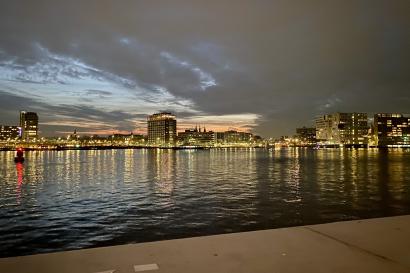
Hey everyone!
On Friday, IES Abroad took all of us on a field trip to Tongli Watertown,which is a two-hour van ride outside of Shanghai. Tonsil is a small town on the outside of Suzhou, and is well-known for the system of canals that run through the town, which is why it is sometimes called the “Venice of the East.” Tongli also has a famous private garden, the Retreat & Reflection Garden, which we got to walk through. I’m not entirely clear on whether or not the garden was also a residency when it was built, but there are many rooms that are built around the main garden which were once used for hosting guests. The courtyards were very interesting because they were all made with the Chinese practice of fengshui in mind. For example, the rainwater is directed from the roof into the courtyard, as the collection of water is considered good fortune in the town. Because there was the expectation of rainwater collecting in the courtyard, the flooring is made out of an intricate pattern of small stones with ample open ground within the pattern for the rainwater to easily soak into the ground. Each corner is also adorned with a square stone that is carved to look like the traditional coins.
The garden itself was beautiful. It featured a large pond. and according to our tour guide used to open on both sides to the canal systems so that the owner was able to dock his boat right in his pond. Now they have cut those pathways off to make the garden a contained space that is very quiet and peaceful. Towards the garden exit is a rock that visitors are encouraged to touch, as it will bring you happiness. I always like when touristy places have good superstitions like that; I think it makes them feel more welcoming and is a good way to encourage tourists to actively experience what may be a completely new culture.
After lunch, we all took a relaxing boat ride through the canals of the town, which was a cool way to see the layout of the town. Tongli is a working town where people practice a very traditional way of life. For example, as we rode through the canals, we would see people washing clothes right in the water of the canal. Most of the town’s residents seemed to be older, although there were also quite a few children. As there were not very many younger/middle aged residents, I would hazard that the small children were living in the town with their grandparents, while their parents work in one of the larger cities, such as Shanghai or Beijing.
This is actually a very common practice in China, where the parents will go away to work and leave their small children to be raised by the grandparents. It is for this reason that it is pretty rare to see a small child in the care of a younger or middle aged parent, although some of the richer families will hire an 阿姨 (āyí - in this case, a nanny) to help raise the child. I’m actually a big fan of this method, because I think it is a great way to keep the older generation engaged while also having someone trustworthy take care of your child. I think that in the US we too often put our elders in homes, where they are taken care of but out of the way with nothing to do. I think that in many ways this distancing is what leads to such high levels of depression in the elderly population, as they have less stimulation and human contact. Utilizing their time and child-rearing experience kills two birds with one stone, as they have a project and the parent now has a built-in babysitter. Of course, parental involvement in child care is also important, but for the time that the parent would normally be out of the house anyways, I think that this is a great solution. I have heard that there are places in the US where joint nursery homes and daycares are opening up, and I’ve heard good things about them, so I really think the Chinese have the right idea.
Anyways, that’s all I have for now. Until next time!

Katie McGee
<p>Hello! My name is Katie McGee, and I am a junior at the University of Puget Sound, located in Tacoma, WA. I am a Chinese major with a Japanese minor and a Global Development Studies emphasis. I am a Chinese adoptee, and although my parents did their best to expose me to Chinese culture as a child, I grew up in a community with very little diversity. I have devoted this year to traveling East Asia (South Korea, Taiwan, Mainland China, and Japan) and improving my Chinese along the way. I have already learned so much during my travels, but continue to look forward to what adventures lay ahead.</p>





